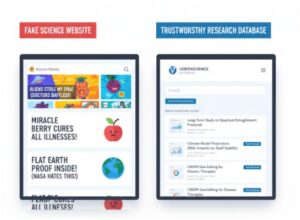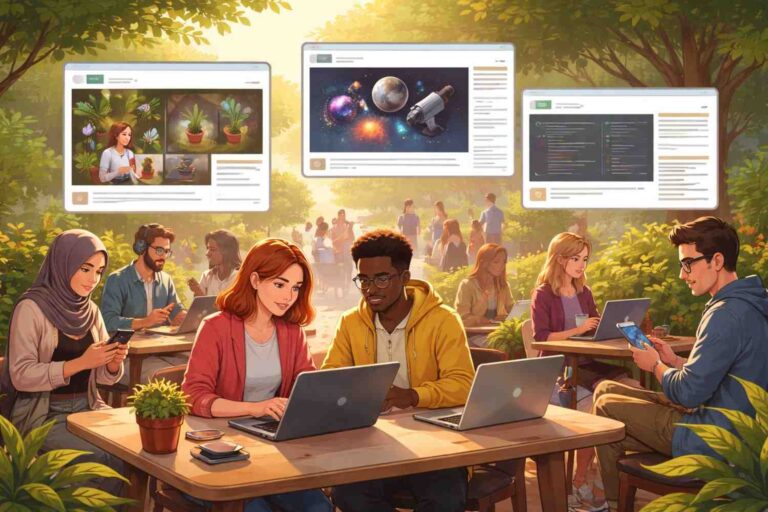I’ll admit it—I once clicked on a headline from worldwidesciencestories.com because it promised something wild: an “alien mummy” found in Egypt. My inner sci-fi geek got excited, and I thought maybe I’d stumbled on a groundbreaking discovery.
A few minutes later, after cross-checking with actual science outlets, I realized I’d been tricked by a site that thrives on misinformation. That experience taught me how easily a flashy claim can pull you in, and why you need to know which science sources you can trust.
What is worldwidesciencestories.com really about?

At first glance, worldwidesciencestories.com looks like a tech and science news site. The design feels familiar, and the articles have the kind of dramatic titles that make you want to click. But if you scratch the surface, things don’t hold up.
The site has a very weak digital footprint. It doesn’t show up in trusted science directories, and there’s little transparency about who runs it. Online forums, especially Reddit, are full of people questioning its legitimacy. When a website can’t back up its bold claims with credible sources, it’s a red flag.
Reputable science news doesn’t just throw out shocking headlines. It’s backed by research papers, experts, or at the very least, links to legitimate organizations. That’s where worldwidesciencestories.com falls apart—it thrives on the kind of sensationalism that catches attention but doesn’t withstand scrutiny.
Why does misinformation like this matter?

Some people might shrug and say, “So what if a site posts a fake story about an alien mummy?” But the problem runs deeper. Sites like worldwidesciencestories.com feed into the cycle of misinformation that spreads quickly online.
When people share false claims without checking, they dilute the value of real scientific discoveries. Imagine a teenager doing a school project and stumbling across fabricated content. Instead of learning about real breakthroughs in medicine or astronomy, they end up parroting a hoax. That’s not harmless—it damages trust in science as a whole.
Plus, there’s the sneaky part: sites that publish fake science stories sometimes use them as bait for scams. They lure you in with click-worthy content, then push ads, ask for email sign-ups, or worse, try to collect personal data. That’s why I see it as more than just bad journalism—it’s potentially unsafe.
How can you tell if a science site is legit?
This is the big question, right? When I got fooled by worldwidesciencestories.com, I started building my own little checklist to keep myself safe online. Here’s what I look for when I land on a site claiming to report on science:
First, I check the authors. Real science outlets usually have clear bylines, often with credentials. If an article about DNA sequencing is written by someone with no background or by “Staff Reporter,” I get skeptical.
Next, I look for sources. Legitimate science stories almost always reference studies, journals, or quotes from experts. If a site publishes shocking claims without pointing to any kind of supporting research, I treat it as fiction.
Finally, I check the site’s footprint. Does it have recognition from trusted institutions? Do people in academic or research communities acknowledge it? With worldwidesciencestories.com, the answer is no, and that speaks volumes.
Where should you go instead of worldwidesciencestories.com?
Here’s the good news: there’s a trustworthy alternative, and it’s hiding in plain sight. The official WorldWideScience.org is a global science gateway that provides access to vetted research from all over the world.
It’s backed by organizations like the International Council for Scientific and Technical Information (ICSTI) and supported by government agencies. That means you’re not getting clickbait—you’re getting reliable, peer-reviewed content. When I use WorldWideScience.org, I know I’m reading material that scientists actually stand behind.
The tricky part is that the names are similar, and that’s what makes worldwidesciencestories.com so deceptive. One extra “stories” in the name, and suddenly people are misled into thinking they’re reading from a respected database. It’s like ordering a luxury handbag online and ending up with a knockoff—it looks real until you look closely.
How do you protect yourself from sites like worldwidesciencestories.com?
I’ve developed a simple “trust test” that you can use too. It takes less than a minute and can save you from wasting time—or worse, spreading fake news.
Step one: Ask yourself if the story feels too outrageous to be true. If it sounds like something out of a sci-fi movie, pause before sharing.
Step two: Cross-check with a reputable outlet. If BBC, National Geographic, or NASA isn’t talking about it, there’s a good chance it’s bogus.
Step three: Watch out for ads and pop-ups. Scammy sites like worldwidesciencestories.com often bombard you with clickbait ads that have nothing to do with science. That’s a dead giveaway that they care more about ad revenue than facts.
By running through these quick checks, you’ll spot red flags before getting sucked into false narratives.
FAQs about worldwidesciencestories.com
Is worldwidesciencestories.com a legit science site?
No. It has been flagged for publishing misinformation, including fabricated stories like the so-called “alien mummy” in Egypt. It doesn’t have credible references or backing from recognized scientific bodies.
Why do people confuse worldwidesciencestories.com with WorldWideScience.org?
The names are nearly identical, but they serve completely different purposes. One spreads unreliable stories, while the other is a respected science database supported by global organizations.
Can I get scammed by worldwidesciencestories.com?
While I can’t say everyone will, the risk is there. Sites that deal in misinformation sometimes use shady tactics like misleading ads or email sign-ups. It’s better not to engage at all.
What’s the best alternative to worldwidesciencestories.com?
The safest option is WorldWideScience.org. It connects you to vetted, peer-reviewed research from trusted sources worldwide. If you want science without the scams, that’s where to go.
Fake Aliens, Real Lessons: Why I’ve Learned to Double-Check
I used to think I could spot fake news a mile away, but worldwidesciencestories.com proved me wrong. That embarrassing click on a bogus alien headline turned into a valuable lesson. Now I double-check sources, stick to trusted platforms, and avoid sites that thrive on misinformation.
If you want to save yourself the headache, remember this: curiosity is great, but curiosity with a fact-checking habit is even better. The internet is full of shiny distractions, but your time and trust are worth protecting. And next time someone tells you about a discovery too wild to be true, check WorldWideScience.org before you share it—you’ll thank yourself later.









